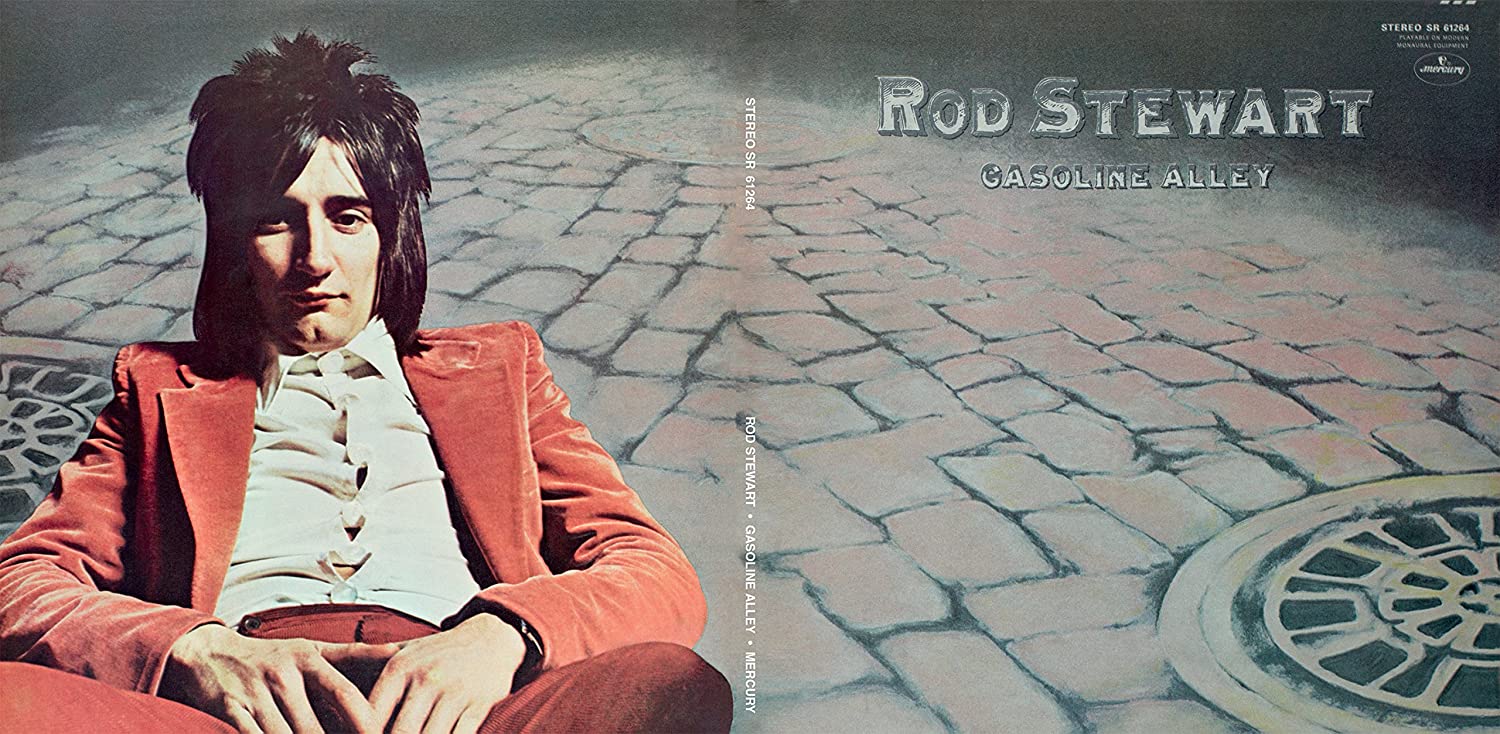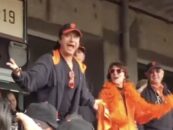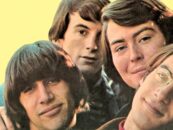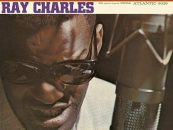Rod Stewart ‘Gasoline Alley’—His Unequaled, Magical Masterpiece
by Rob Patterson
Ask almost anyone who was a dedicated rock fan/listener as the 1960s met the ’70s what their favorite Rod Stewart album is, and chances are 999.9 out of a thousand they’ll say Every Picture Tells A Story, his 1971 breakout album. And for damned good reasons – it’s a killer disc.
However, I’d answer the query a bit differently. Back up an album to his second solo release, 1970’s, Gasoline Alley. (I’d also rate his debut, the somewhat similarly flavored Rod Stewart Album, close behind at #2, But that’s another discussion.)
It’s a recording that is parsecs removed from such later Stewart commercial pandering as “Hot Legs” and “Da Ya Think I’m Sexy” and far different from the two proto-heavy metal albums by The Jeff Beck Group with Stewart as lead singer that preceded his solo career and stint fronting The Faces. And it’s unlike most anything else in Stewart’s now vast catalog, although its echoes can be heard on Every Picture…, Never A Dull Moment and Smiler. And then they fade….
Gasoline Alley arrived on June 12, 1970, almost as an instant artifact, as the cobblestones on its cover imply. There’s a patina of sepia across the whole affair that summons up a sense of historicity, reinforced by acoustic guitars, fiddle and mandolin. Yet it was also right on time for 1970 as a number of U.K. artists were feeling a return-to-the roots influence after the release of The Band’s game-changing Music From Big Pink two years before. It captures a rare magical and now seemingly distant moment in Stewart’s career as well as his singing and songwriting. But it’s less lightning in a bottle and more a warm kerosene lamp.
An aura of the past is evoked by the wistful sentiments of the opening title track, written by Stewart and Ron Wood: “Goin’ home, rollin’ home, back to Gasoline Alley where I started from.” Throughout the song, a slinky electric slide guitar part by Wood – the album’s instrumental co-star, playing at his most inspired – seconds every word Stewart sings in unison. It reinforces the cry of Rod’s palpable longing wonderfully.
Next up, a ballsy move on Stewart’s part: Bobby Womack’s “It’s All Over Now,” which had been the first #1 hit for The Rolling Stones a mere six years before. But where that take was a (very Stonesian) sneer, Rod and company really stick it to the disloyal wench with a rollicking romp of jubilant liberation. Carried along by Ian McLagan’s boozy, hyperactive boogie-woogie piano and Mick Waller’s sloshy syncopated drumming, it epitomizes the pints-down-at-the-pub spirit of the Stewart/Faces union. Then in the middle Woody tears in with whiplashing slide guitar and the song gallops off to its finish like a stallion feeling his oats in spring.
On track three is where the enduring heart of this collection emerges. The Rod the Mod of that day may have been an unabashed rocker. But his reading of Bob Dylan’s “Only A Hobo” is suffused with profound and genuinely humane empathy for a tattered bum in the gutter, Stewart near whispering the words. Similarly, his take on “Country Comfort” by Elton John and Bernie Taupin – whose own version wouldn’t arrive stateside until four months after Gasoline Alley’s release – uncovers the loamy pastoral pleasures of rural life like a horse-drawn plow pulling up the fertile soil of a simple yet purposeful existence.
The collection’s most affecting moments are two Stewart originals. “Lady Day” is confessional drenched with heartache and regret that opens with words that unspool like the chill of a late autumnal breeze as the bass darts about atop a subtle high-hat cymbal beat: “North winds have made my face a little older/And my back is bent through trying too hard.” As the then-26-year-old Stewart sings with the preternatural raspy wisdom of a man who’s traveled many rutted roads, Wood laces the melody with teary bottleneck guitar lines. It’s an open heart that lays its sadness on the line, and a deeply moving four or so minutes of earnest honesty.
“Jo’s Lament” slowly sails through similarly deep emotional waters of apology to the tune of what feels like an ages-old guitar-drenched folk melody, punctuated by a devastating final line: “Now I’m not so young and I am so afraid… to sleep alone for the rest of my days.” At age 16 when I first heard it, the song’s unalloyed emotionality slayed me. Decades later, I wonder how the young Stewart even knew such feelings much less was able to express them so openly… and just what happened to a writer and singer of such courageous tenderness.
Those four tracks alone mark Gasoline Alley as far more a singer’s album than all five volumes of his journey through the Great American Songbook as well as his Soulbook and Great Rock Classics… albums. For as Rolling Stone critic Langdon Winner noted at the time, “Stewart has a rare sensitivity for the delicate moments in a person’s existence when a crucial but often neglected truth flashes before his eyes and then vanishes. The amazing character of Stewart’s work is largely due to the fact that he can recall these fragile moments of insight to our minds without destroying their essence.” It’s a Stewart we haven’t heard since he conquered the arena stage and then partied afterwards at the disco.
And lest we forget, Gasoline Alley hardly skimps on the rock. With his reprise of the Small Faces gem “My Way of Giving,” he assertively signals that they are now his band. The fiddle-driven, loose-limbed take on “Cut Across Shorty” transforms Eddie Cochran’s bopping rockabilly into a back-porch celebration of the common man finally taking the prize.
The set wraps up with a rousing number off Little Richard’s 1966 return to rocking that Delaney & Bonnie, also in 1970, whipped up into a show-stopping tour de force on their live On Tour With Eric Clapton album, “You’re My Girl (Don’t Want To Discuss It).” Stewart backs off the simmering beat and makes it a funk-inflected declaration, howling “You’re… my… girl! with raw authority, accenting the sentiment with cries “woo” and “woo-hoo” to bring the nine-song set to a rousing close.
Gasoline Alley is an album that over all the years since has never failed to not just satisfy but to also summon up both its own singular sense of place and time and a resonance outside all time. It’s Stewart at his realest and rawest, at alternating moments tender and cocksure, singing from the depths of his heart and soul, almost Dylanesque in its artistry. No matter what else he’s done and what I may feel about it, it always reminds me of those days of yore when, for me, Rod was, hands down, a rock ‘n ‘roll voice without compare.
Stewart’s vast recorded library is available in the U.S. here and in the U.K. here.






16 Comments so far
Jump into a conversationI bought Gasoline Alley and the Rod Stewart album last year, because none of his “Best of” compilations do justice to his best work, found on these two albums, and “Every Picture’ and “Never A Dull Moment,”, which are somewhat better known, He had heart, passion, insight, and a great band, and combined elements of Dylan’s folksy elegance and the upcoming Springsteens street smart savvy,
And I gotta say, Rob Patterson nailed the essence of why I still play these records for younger friends perfectly,
Sheer coincidence–I happened to put this album on in my car this morning. I don’t think its highs are quite as up there as those of Every Picture (Maggie May, Mandolin Wind, Reason to Believe) butif not as good as that album, Gasoline Alley is certainly a close second in Stewart’s catalog.
Great album but Never a dull ‘ beats it hands down. EVERY song on that lp is a stone wall classic. From True Blue to Twistin the night away…gems all.
Wise words indeed mate. I played the grooves out of dull moment. Possibly one of the best lp’s in the 70’s. By far and away Rod’s best.
Agree with all you say here. The artistic decline of Rod’s career is a musical tragedy. Will add that over here in the UK Rod’s first album was called ‘An Old Raincoat Will Never Let You Down’, a more inspired title that ‘The Rod Stewart Album’, I think you’ll agree.
This is the best piece I ever read about Gasoline Alley and one of the best on Rod Stewart too.
Gasoline Alley, the beck albums, the faces, the solo stuff through 74…gosh the output is what 10 lps in 5 years… and with the touring unprecedented..
But honestly how many tracks could he continue with the same sound of rootsy rousing rock n country…
If you listen to the later lps he never totally leaves his roots and sometimes ups it a notch…For every Tonights the Night there is a Scarred and Scared, for every Do Ya think there is a cover like Standing in the Shadows…or People Get Ready, Downtown Train…Post 1974 Rod has tremendous songs from all styles and has kept relevant in doing so.
Timeless voice..
Hidden Trax everyone should ck out:
1) Never Give Up on a Dream
2) You Keep me hanging on
3) Your Song
4) Foolish Behavior
5) Just Like a Woman
6) Every Beat of my heart
7) Ten Days of Rain
8) The Wild Horse
9) Dancin Alone
10)This
11) SweetHeart Like U
12) What do you want me to do
13)To Be with you
14) Don’t Come Around Here
15)Father and Son
16) Its over
17)Hold the Line
18)Grace..
Just a partial list
Absolutely hit it right on the head. That and his first album were my faves. The later ones were okay but not as good IMHO
Great second album, but the first and third Stewart releases are better. I suppose everyone might have different favorite tracks, but you seem a bit dismissive of what I think is easily the best song of all – Cut Across Shorty.
Great call. I wore out 3 albums playing “Cut Across Shorty”
A nods as good as a wink I a superb album by Rod with the faces.
Rod Stewart is definitely one of the Best front-men and singers of all-time. His early to late 70s is brilliant. “Once a Rocker, Always a Rocker,” stay away from the Frank Sinatra songs, that unfortunately was your downfall.
Listening to Gasoline Alley makes me sad. Ditto An Old Raincoat Won’t Let You Down/the Rod Stewart Album. Ditto Every Picture Tells A Story. Why? Quite simply, because Rod’s first three albums demonstrated what we have missed. That sandpaper voice was at its best, his cover versions – of which there are many; possibly too many – are an improvement on the originals and his songwriting/storytelling was beyond compare. Just listen to the title tracks of those three albums, plus (of course) Maggie May and you are hearing a genius at work. And … he recorded those three albums in a matter of eighteen months. There was some fine work on Never A Dull Moment but not throughout the entire album. Oh Rod, you were so damn good, if you had stuck to your early ways and days you would have been the best. I always think he produced his best work – live, as well – when he had Ronnie Wood, Ian McLagan and Mickey Waller playing alongside him.
Lovely tribute to the man and his early period work, of which, I too, agree wholeheartedly. But what’s also shown in these recordings that’s also been lost, IMHO, is the fact that once upon a time, Ron Wood was quite a musical artist, and his early pairings with Rod, maybe more so on Rod’s solo recordings than the Faces even, lent Wood the opportunities to play some brilliant and, in some cases, iconic guitar parts both electrically and acoustically. Not only does it seem like he basically disappeared musically once he joined the Stones, but in the rare occasions when he is spotlighted, either with the Stones or during other special events, he sounds and acts like a complete faking amateur who’s living on his laurels. In that sense, it seems like both he and Stewart were both somehow tragically, and somewhat mysteriously, lost in the annuls of great British rock and soul music. While I mourn them both, we still have those great records.
Great comment, I 100pct agree. He really and truly shines in the Stones’ tours where he masterfully, brilliantly fills in for both Brian and Mick T.
However accolades don’t pay rent, and the money from the Stones sure must be amazing.
Not sure who writes this but I have to STRONGLY disagree. Rods finest album- by a country mile- is Never a dull moment.
Rod’s own songs- Italian Girls, True Blue and Los Paraguaos far outstrip anything on Gasoline. His Dylan and Hendrix covers are now well known as two of his best.
You wear it well is maybe his best composition.
To finish the album a knock out Twistin the night away.
By far more a fun album than Gasoline- in fact more fun and more polished . A masterpeice.